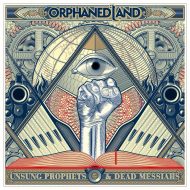 When I was younger I spent a lot of time in Israel and during every trip I would eagerly make my way to a record shop and ask the same question. “Do you have any Israeli heavy metal?” On the few occasions that the shop assistant was familiar with the genre I was asking about, I was told that there was no local metal. Everything was imported. I was sure that somebody was making good music, but it was clearly so far underground that I couldn’t find it. On one occasion, word reached me about a gig that I might be interested in and I found myself watching Melechesh in a basement club in central Jerusalem. I finally knew that what I was looking for existed, but it was still impossible to buy their music even though I had the name of a band to ask for. I persisted and eventually came home with an album called El Norra Alila and a new name to ask for – Orphaned Land.
When I was younger I spent a lot of time in Israel and during every trip I would eagerly make my way to a record shop and ask the same question. “Do you have any Israeli heavy metal?” On the few occasions that the shop assistant was familiar with the genre I was asking about, I was told that there was no local metal. Everything was imported. I was sure that somebody was making good music, but it was clearly so far underground that I couldn’t find it. On one occasion, word reached me about a gig that I might be interested in and I found myself watching Melechesh in a basement club in central Jerusalem. I finally knew that what I was looking for existed, but it was still impossible to buy their music even though I had the name of a band to ask for. I persisted and eventually came home with an album called El Norra Alila and a new name to ask for – Orphaned Land.
Musically it was what I was hoping for; heavy guitars and growly vocals but clearly Israeli. And it was inspiring to find a beacon of peace and unity in the sea of right wing divisiveness and hate that was prevalent at the time and continues to be the case now. The integrity of their message is evidenced by their large fanbase in the Arab world which is an outstanding achievement.
Unsung Prophets and Dead Messiahs is a concept album based on the Allegory of the Cave by Plato. The message in this album is different from Orphaned Land’s previous work. Rather than examine the political and religious systems that polarise us and inspire hatred, Unsung Prophets and Dead Messiahs focuses on humanity’s apathy and resistance to change. We kill the people that try to unchain us and lead us to the light, and like the prisoners in the cave we choose the devil we know rather than the pain, anger and uncertainty of revolution and building a better world.
Opening track The Cave sets the stage for the rest of the album and contains a bit of everything that is to come. Middle-Eastern motifs, traditional instruments and a choir are blended with guitars, drums and both clean and growly vocals. At over eight minutes long it is not concise, but there is a lot to cover both in the music and the lyrics.
Previous albums have been metal at the core with Middle-Eastern flavours, however Unsung Prophets sounds very much like Mizrahi* rock music with an occasional heavier influence. The majority of frontman Kobi Farhi’s clean vocals are in a high key and although in places it conveys earnest emotion, he frequently sounds like a religious cantor in a synagogue. Yedidi, a traditional liturgical poem, is a familiar song from my childhood. Orphaned Land have embraced Jewish texts in the past and made them relevant and contemporary whilst still being rooted in history, but Yedidi sounds clichéd and conventional.
Chains Fall to Gravity is prog rock that features an interesting interplay between Western sounding guitars (played by Steve Hackett from Genesis) and Middle-Eastern instruments and motifs. It is a lengthy track that once again incorporates the orchestra, Hellscore Choir and Farhi’s clean vocals, and it feels self-indulgent in places.
The highlight for me is penultimate track Only the Dead Have Seen the End of War with guest vocalist Tomas Lindberg (At The Gates etc). All the musical elements finally feel completely integrated and Lindberg’s growls are the icing on the cake. The intensity builds to the climax of the story, and the choir shouting “kill him!” is powerful and evocative.
Unsung Prophets and Dead Messiahs has a different balance of Eastern to Western music than Orphaned Land’s previous material. It also feels like it was created putting the message first rather than the music which has not served the album overall. Some tracks could be Israeli radio music (In Propaganda), and although the message has depth sometimes it is missing in the music.
*Mizrahi music is Israeli pop that has its roots in Arabic and North African music.
(5/10 Abi Grahame)
https://www.facebook.com/OrphanedLandOfficial

Leave a Reply